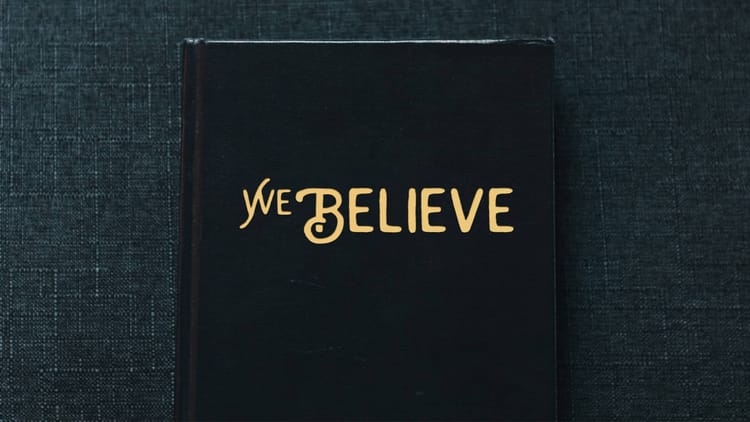But God (Ephesians 2:1-10)

If you're like me, you've had a debate with yourself about when to go to the doctor and when not to go, because things will probably clear up on their own. I had something just the other week. I finally made an appointment after months of procrastination. Charlene said that it was great I finally made an appointment, but by the way things looked I'd probably be dead by Friday, the date of the appointment.
Not knowing when to go has terrible consequences. The Heart and Stroke Foundation says, "Thousands of Canadians die from heart attacks every year because they don't get medical treatment quickly enough. Learn to recognize the signals of a heart attack, so you can react quickly to save a life." People die because they think that they're only experiencing some other type of pain, when they're really experiencing something far more serious.
The same thing happens spiritually. John Piper says that the passage we're looking at today contains a number of things that nobody really believes. If the passage before us is right, then a lot of us have misdiagnosed our condition, and the consequences can be fatal.
So let's look at what this passage says, first about our condition; then about the remedy; and then about the implications.
First, what is our condition?
Read verses 1 to 3 with me:
As for you, you were dead in your transgressions and sins, in which you used to live when you followed the ways of this world and of the ruler of the kingdom of the air, the spirit who is now at work in those who are disobedient. All of us also lived among them at one time, gratifying the cravings of our sinful nature and following its desires and thoughts. Like the rest, we were by nature deserving of wrath.
In these first three verses, the apostle Paul gives us a true picture of the human condition. It's something that we're going to struggle with. This is a repugnant teaching, and for years people have objected to this. Ever since the Enlightenment, people have argued that children are born innocent, and we mess them up with our culture and education. Blaise Pascal, who is smarter than anyone I know, struggled with this doctrine but in the end had to say, "Certainly nothing jolts us more rudely than this doctrine, and yet, but for this mystery, the most incomprehensible of all, we remain incomprehensible to ourselves." Without understanding what Paul says here, we will remain incomprehensible to ourselves. We won't be able to make sense of our own lives, never mind the world around us.
So what is the human condition? Paul unpacks it in three ways. First, he says, humanity is dead. "As for you, you were dead in your transgressions and sins." We are spiritually dead. We are not in danger of death; we are not half-dead; Paul says we are actually dead. To quote Piper again, we're in the morgue, not the doghouse. In the doghouse we can whimper, apologize, and throw ourselves on God's mercy. But what can you do in the morgue? Nothing. This is the human condition. We are completely dead in our sins.
There are really three views of human nature out there. One is that humans are well, and there's nothing really wrong with us. They talk about the greatness of human potential. Some have believed this, but it's getting harder and harder with wars and guns and poverty and genocide. You can't really pick up the newspaper, or even look within our lives, and say that humanity is well, and there isn't anything wrong with us.
The second view of human nature is actually the most popular. It's the view that humanity isn't well; it's probably sick. We are capable of great evil, but with the right education, the right upbringing, we'll be okay. We're capable of choosing good or evil, and with the right effort and training we can choose to be good most of the time.
This is by far the most popular view, not just in the world but probably also in the church. If you believe that we're only sick, then what we need is someone to be our example or our teacher.
This leads to what is called Pelagianism, which is our default way of thinking, but it's also dead wrong. Pelagianism was originally taught by a man named Pelagian, who lived from 354 to about 420. He taught that Adam's sin set a bad example, but it didn't affect the rest of us. Human nature is fine, and we can choose good or evil ourselves. Some of you may remember being taught this in the Flintstones, if you used to watch it. Somebody would be whispering in one ear to do the right thing, someone else in the other ear to do something bad, and we get to choose.
There's another view, by the way, that's similar. It's called Semi-Pelagianism. It's the view that salvation is a joint effort between us and God, and that once we make the first move toward God, God does the rest. We don't have to remember the names Pelagianism or Semi-Pelagianism, but we have to remember that it's a serious mistake to think that we can contribute anything to our salvation, or even make the first move. It's far too serious for that.
But here Paul says that we're not well, and we're not even sick. There's nothing we can do. We can't make the first move; we can't do anything. We're dead. We're completely hopeless. Theologians call this total or pervasive depravity. Every human has been affected in every area of life, so that no part of the human person — mind, emotions, conscience, will — is unaffected by sin. Paul says that this is our condition. We're not well; we're not sick; we're actually dead in our sins.
It gets worse. You may be wondering how it could possibly get worse. Paul says that humanity is not only dead; humanity's enslaved. Verses 2 and 3 say:
…in which you used to live when you followed the ways of this world and of the ruler of the kingdom of the air, the spirit who is now at work in those who are disobedient. All of us also lived among them at one time, gratifying the cravings of our sinful nature and following its desires and thoughts.
It's bad enough that we're spiritually dead, but the news gets worse. Humanity is enslaved to three forces over which we have no control:
- One is the world – "the ways of the world," Paul says in verse 2. We're all influenced, far more than we think, by society's attitudes, habits, and preferences. We're products of our culture – fashion, newspapers, and so on. But many of our culture's values are alien to God and his standards.
- We're also sabotaged by the devil, "the spirit who is now at work in those who are disobedient." This is even more important for us to realize, because we often underestimate the power of the spirit world. Some overestimate Satan's influence; we probably ignore it too much. Satan has been defeated by Christ, but doesn't surrender without a struggle. He's a murderer and a liar, and he still continues his work.
- Then there's our flesh – what Paul calls "the cravings of our sinful nature…following its desires and thoughts."
So humanity isn't sick, it's dead. And it's not just dead. It's in bondage to the world, the devil, and the flesh. But wait – it gets worse.
Paul also says that not only is humanity dead and enslaved; it's also condemned. Verse 3 says, "Like the rest, we were by nature deserving of wrath." We read this and think, "You've got to be kidding. God's wrath?" Yes, wrath. Last weekend I got news that the daughter of a Fellowship pastor was murdered. I felt a lot of emotions, but one of them was wrath. Granted, it was not a completely just wrath. When you see the awfulness of sin, then it's completely just and reasonable that the holy wrath of God should be against it. God's wrath is consistent, just, controlled, and judicial. Paul says that by our very natures, we are all deserving the wrath of God.
This is very bad news. This isn't about a particularly bad segment of the population; this is about all of us.
As John Piper says, nobody really believes this:
The first thing I want to stress today is that these three things are not what you will find out about yourself in the newspaper or TIME or NEWSWEEK. They are not part of our cultural assumptions about mankind. Virtually no one, outside a fairly small group of evangelicals, seriously believes
- that without a Savior all people are dead in sin and incapable of any spiritual good; and
- that without a Savior all people are captured and blinded by an evil, supernatural person named Satan; and
- that without a Savior all people are under the wrath of God and sentenced to eternal torment in hell.
There are two fundamental reasons why these things are not believed:
- because they are unflattering to human nature, and
- because they have to be learned from God not man.
Because we don't believe this, we're open to superficial solutions that never really deal with how serious our condition is. If we misdiagnose our condition, then the results are disastrous.
The late Jack Miller, a pastor from Philadelphia, used to say, "Cheer up, you're worse than you think you are." The reason that Jack Miller could say this is that he knew what was coming next. What's coming next could be the two greatest words in the whole Bible. Paul has told us what our condition is. We need to ask:
Second, what is the remedy?
Verses 4 to 7 say:
But because of his great love for us, God, who is rich in mercy, made us alive with Christ even when we were dead in transgressions—it is by grace you have been saved. And God raised us up with Christ and seated us with him in the heavenly realms in Christ Jesus, in order that in the coming ages he might show the incomparable riches of his grace, expressed in his kindness to us in Christ Jesus.
There are the two greatest words in all the Bible: "But…God." They're especially great when you realize that God didn't have to do anything. He could have left us in our natural state: dead, enslaved, and condemned. But then come these amazing two words. One of the best sermons that you could ever listen to comes from the Welsh preacher Martyn Lloyd-Jones. He preached on these two words and said, "These two words ["But God"], in and of themselves, in a sense contain the whole of the gospel." They tell us what God has done, and how he has intervened in what would otherwise be a hopeless situation.
What has God done? He has "made us alive with Christ, even when we were dead in transgressions." Notice when this happened: when we were dead. It's not like we were in the middle of getting our lives back together, or after we had made the first move. It's while we were still dead that God raised us into new spiritual life.
Verse 6 also says that we've been raised up with Christ and seated with him in the heavenly places. What Paul is saying is that we share in Christ's resurrection, ascension, and his reign. We were dead, enslaved, and condemned; now we're alive, free, and enthroned.
Why did God do it? Notice that it is not because of anything related to us. It wasn't prompted by our merits; it's entirely prompted by his own character. That's why we read about his love, mercy, grace, and kindness in this passage. We are saved entirely because of the undeserved favor of God, who has responded to us despite our desperate condition.
Remember what Jack Miller said? Let me give you the rest of what he said. "Cheer up: you're worse than you think you are, but God's grace is greater than you could ever imagine!"
I want to close with just two implications for us.
The implications come from verses 8 to 10:
For it is by grace you have been saved, through faith—and this is not from yourselves, it is the gift of God— not by works, so that no one can boast. For we are God's handiwork, created in Christ Jesus to do good works, which God prepared in advance for us to do.
Just two things as we close. Paul says repeatedly in these last verses that all that we have in Christ is by grace. If we've been made right with God, it has nothing to do with us. Paul even says that the good works that we do as believers are a result of God's initiative. We can't take credit for them either. They are what God prepared in advance for us to do.
He applies this to us by saying that nobody can boast. Since we can take none of the credit, we can do none of the boasting. Those of us who trust Christ don't have to pretend we're better than we really are. We can face the truth about ourselves, because in our sin we have found God's grace, and that is more than enough. We can't take any credit.
One last thing. You see how we are saved: "by grace…through faith." Even our faith here is a gift from God; it's not anything we can take credit for. What is faith? I'll put it as simply as I can: belief and trust. If you believe what we've talked about today – that we're naturally dead, enslaved, and condemned, but that God has acted through Christ to save us because of his grace and mercy – then that's good. That's belief. But you also need trust. Trust is a heart response. It means responding to this message, casting yourself upon Christ, and accepting his work on your behalf.
Dietrich Bonhoeffer says:
It is the grace of the gospel, which is so hard for the pious to understand, that confronts us with the truth and says: You are a sinner, a great, desperate sinner; now come, as the sinner that you are, to God who loves you. He wants you as you are; He does not want anything from you, a sacrifice, a work. He wants you alone… God has come to you to save the sinner. Be glad! The message is liberation through truth. You can hide nothing from God. The mask you wear before men will do you no good before Him. He wants to see you as you are, He wants to be gracious to you. You do not have to go on lying to yourself and your brothers, as if you were without sin; you can dare to be a sinner. (Life Together)
So come.





